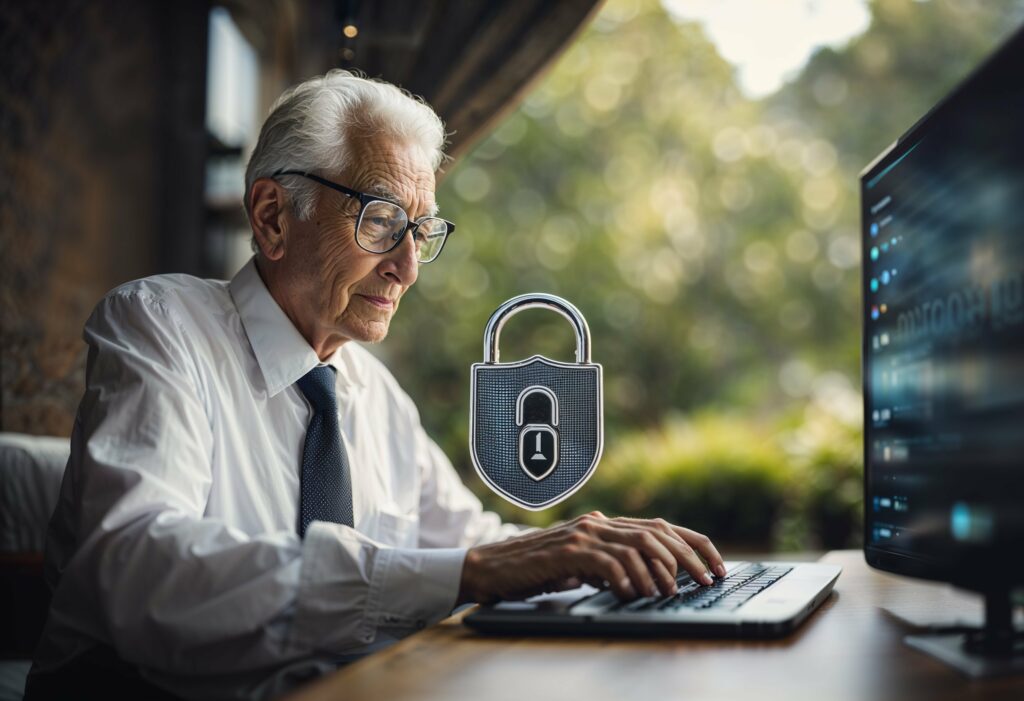You don’t have to be a computer whiz to stay secure online. Simple habits, like setting strong passwords and knowing how to spot a scam email, can be your seatbelt on the information superhighway. Remember, cyber safety isn’t just for the young. It’s a smart skill at any age. By staying informed and cautious, you can enjoy all the perks of being online without falling prey to the pitfalls.
Key Takeaways
- Strong passwords and knowing how to spot scams are critical for online security.
- Cyber safety is a necessary skill for users of all ages.
- Simple, informed habits can greatly enhance internet safety for seniors.
Online Safety for Seniors: Understanding Internet Basics
Navigating the online world doesn’t have to be daunting. Understanding a few basic elements will set you up for a safer and more enjoyable experience as you explore the vast world of the internet.
What is the Internet?
Think of the internet as a global network connecting millions of computers. It’s like a web of endless information and possibilities right at your fingertips. No matter where you are in the world, if you’ve got an internet connection, you can access a treasure trove of knowledge, entertainment, and social interaction.
The Role of Browsers
Browsers are your gateway to the internet. They’re the tools—like Google Chrome, Mozilla Firefox, or Safari—that you use to visit websites by typing in web addresses or clicking on links. It’s like using a remote to flip through TV channels, but instead, you’re browsing through web pages.
Search Engines and How They Work
Now, imagine you’re looking for a specific recipe or the latest news—search engines are your go-to. Type in a few words related to what you’re seeking, and voila, you get a list of web pages. Google, Bing, and Yahoo are a couple of the big names that come to mind when talking about search engines. They work by scanning the internet to find sites that match your search terms.
Introduction to Social Media Platforms
Social media platforms like Facebook, Twitter, and Instagram are like online communities or gatherings where you can share stories, photos, and stay connected with family and friends. Remember, it’s a public space, so it’s important to be mindful about sharing personal details. Social media is a great place to catch up and stay in touch, especially if you’re tech-savvy and enjoy being a part of the digital conversation.
Identifying and Avoiding Online Scams
Navigating the web can be tricky with scammers lurking around. As seniors, it’s crucial to stay vigilant and recognize the tell-tale signs of online trickery to protect ourselves and our hard-earned money.
Common Types of Internet Scams
Phishing and Email Fraud
These scams are like fishing trips for your personal info. Fraudsters send emails impersonating your bank or a service you trust, baiting you with urgent messages that often contain links to fake websites. Remember, no reputable organization will ever ask for your sensitive information via email. When in doubt, don’t click on the links! Instead, go directly to the official site by typing the address in your web browser.
Social Media Scams and Frauds
Social networks can feel like our digital hangouts, but they’re also hot spots for cons. Ever seen those quizzes promising to reveal your movie star lookalike? They may be collecting more than just your laughs. Watch out for any message or post that prompts you to share personal details or send money—even if it looks like it’s from a friend.
Spotting and Preventing Online Shopping Scams
Shopping online should be about snagging deals, not getting duped. Scammers set up fake shops or listings, often with prices that seem too good to be true (because they are!). Always check reviews and seller ratings, and make purchases through secure payment systems. If a website asks for a direct money transfer, wave it goodbye and look elsewhere.
Safeguarding Personal Information
Keeping your personal info under lock and key isn’t just about peace of mind—it’s a crucial defense against identity theft and online fraud. Especially when it comes to online banking, every step you take to protect your sensitive information could be what stands between you and a cybercriminal. So let’s roll up our sleeves and get started.
Creating Strong Passwords
Hint: Think of passwords like the keys to your digital home. Would you use a flimsy key for your front door? I didn’t think so. A strong password usually consists of at least 12 characters and includes a mix of letters (both uppercase and lowercase), numbers, and symbols. Avoid the obvious don’ts—like using ‘password’ as your password or stringing together easily guessable info like your grandchild’s name and birth year. Remember to shake things up! Use different passwords for different accounts.
The Importance of Password Managers
Now, you might think, “How am I supposed to remember all these different complex passwords?” That’s where a password manager steps in. With a password manager, you can store all your passwords securely and only have to remember one main password. It’s like having a personal vault where all your passwords are kept safe. Plus, many of them can help you generate those complicated passwords that are tougher to crack.
Protecting Personal and Sensitive Information
Rule number one: Your personal info should be guarded like a secret family recipe. Be cautious about sharing sensitive information such as your date of birth, social security number, or bank details. Adjust your privacy settings on social media to limit what’s shared publicly, and be skeptical about emails or calls asking for your info—this could be a phishing attempt. Always double-check the source before revealing anything.
Securely Navigating Online Banking
Online banking is convenient, isn’t it? But convenience should never open a door to risk. Ensure the website you’re using has a padlock symbol beside the URL, indicating a secure connection. Never access your bank account from a public Wi-Fi network; it’s like giving your bank PIN to the person in line behind you at the grocery store. Set up alerts for any unusual activity—better safe than sorry!
Enhancing Cyber Security for Seniors
When it comes to staying safe online, it’s important for seniors to employ a range of strategies to protect against threats like malware, identity theft, and various online scams.
Understanding and Using Antivirus Software
Antivirus software is your first line of defense against the pesky intruders we call malware. Imagine this software as a trusty guard dog, always on the lookout for anything fishy. Install it, keep it updated, and let it do its thing—sniffing out and blocking viruses before they can wreak havoc.
Navigating the Internet Safely
Stroll through the internet with the same caution as you would through a crowded marketplace. Be wary of offers that seem too good to be true—they usually are! Adjust your security settings to secure your digital footprint and remember, not sharing your personal info online can be a key to avoiding identity theft.
The Essentials of Virtual Private Networks (VPNs)
Think of a Virtual Private Network (VPN) as a secret tunnel for your online activities. It hides your footsteps from prying eyes, making it tougher for hackers to track you. A good VPN is like a cloaked route that gives you a safer path through the wilds of the internet.
Multi-Factor Authentication and Why It Matters
Imagine your online account like your home. You wouldn’t rely on a simple latch, right? Multi-factor authentication is like having a deadbolt, alarm system, and a big barking dog; the more hurdles for the bad guys, the better. It’s an extra step, sure, but it’s worth it for the peace of mind.
Dealing with Cyber Threats and Crime
With cyber threats on the rise, it’s more important than ever for older Americans to stay vigilant and know how to respond when targeted by online criminals.
Recognizing Cyber Criminal Activities
Understand the tricks cyber criminals use—like phishing, where a seemingly innocent email can turn into a nightmare if you click the wrong link. Always question: Is this email really from my bank?
Actions to Take After Identity Theft
If you’re hit by identity theft, report it to the Federal Trade Commission (FTC) immediately. Then, start changing passwords; make them long, unique, and locked down tight.
How to Report Internet Crime
Take a stand and report internet crime to the Internet Crime Complaint Center or contact your local FBI office. It helps put those hackers where they belong: far away from your hard-earned money.
Internet Safety for Older Adults
Being online doesn’t have to be scary. You can follow simple steps such as securing devices with passcodes and avoiding oversharing on social media to stave off many common online threats. Learn more tips from sources like the Morgan Stanley’s guide on cybersecurity for older adults. Stay safe; you’ve got this!
Practical Online Safety Tips

Understanding the risks and knowing the right steps can make all the difference in your online endeavors. Let’s keep your digital experiences both enjoyable and secure with a few practical strategies.
Safe Online Shopping Practices
When you’re eyeing that perfect gift or bargain, consider these pointers for online shopping. Always use reputable websites; look for a padlock icon next to the website address to ensure encryption. Remember to use unique, strong passwords for each site and update them regularly. Avoid storing card information on websites and consider a payment service for an extra safety layer.
Online Dating: How to Stay Secure
Online dating can be a whirlwind, but don’t let it sweep away your common sense. Keep personal details private and never send money to someone you’ve only met online – that’s a red flag for online dating scams. Share your plans with a friend when meeting someone new, and always do so in public spaces.
Smartphone and Tablet Safety Tips
Your smartphone and tablet are gateways to a world of information and connection. Keep them locked with a passcode or biometrics like a fingerprint. Regularly update your devices to patch security vulnerabilities. Be cautious about the apps you download – stick to the official stores and check reviews.
Public Wi-Fi: Usage and Precautions
Public Wi-Fi is convenient but can be like swimming in shark-infested waters if you’re not careful. Avoid accessing sensitive information like online banking on unsecured networks. Use a VPN (Virtual Private Network) for better security. Turn off Wi-Fi when not in use, and definitely think twice before doing any shopping or banking on these networks.
Guidance for Caregivers and Families
Taking steps to ensure the online safety of our seniors is essential. You don’t have to be a tech guru to make a big difference; just a few simple actions can provide substantial protection.
Educating Seniors on Internet Security
It’s like locking the doors at night — simple habits go a long way in keeping seniors safe online. Start by teaching them about common scams and the importance of strong passwords. Remember, straightforward advice works best, like reminding them never to share personal info in response to an unexpected request, even if it looks official. There’s plenty of support out there, like the CISA Cybersecurity Awareness Program for Older American Resources.
Support Networks and Resources
Set up a tech-friendly buddy system. Whether it’s family, friends, or a caregiver, make sure there’s someone the senior can reach out to with tech questions. Tap into resources like the Internet Crime Complaint Center for when things seem fishy. It’s teamwork that makes the dream work.
Customizing Safety Settings for Easier Use
Dive into those privacy settings — they’re not just there for show. Adjust the settings on social networking sites and devices for optimal safety based on the senior’s usage. It’s like setting up the right seat height for a driver; everything should be tailored for ease and safety.
Staying Informed: Resources and Updates
Keep abreast of the latest scams and software updates. Government agencies and the Pew Research Center can be goldmines of information. Operating systems and applications should be up-to-date to fend off vulnerabilities — set them to update automatically, and that’s one less thing to worry about.
Advanced Internet Safety Measures

Now, let’s step up your security game. It’s not just about clicking ‘no’ to those pesky pop-ups anymore; we’re diving into some of the more nuanced and beefy security strategies.
Exploring Advanced Security Software
Remember back in the day when a simple antivirus was enough? Now, we need the big guns. Antivirus software has evolved and offers features that can make your head spin – in a good way. Think real-time scanning and automatic updates that handle viruses and malware without you lifting a finger. Embrace complex software; it’s like having a personal bodyguard for your computer.
Understanding Secure Online Communication
You wouldn’t share your secret recipes with just anyone, right? Same goes for online communication. Make sure your email provider has encryption in place. That way, when you send an email about the grandkids or the latest book club meeting, it’s locked tight. Encryption is like sending your letters in a safe, and only the one with the right key (your intended recipient) can open it.
Staying Protected Against Latest Cyberattacks
Cybercriminals get smarter by the minute. Today they’ve got phishing tricks that could fool even the savviest of us. Look out for those spam emails and strange messages asking for your details – they’re often bait. And remember, if an offer in your inbox looks too good to be true, it usually is. Be like a mythical hero – always on guard.
Evolving Security Trends and How to Adopt
Trends aren’t just for fashion – they matter in security too. Stay in the know. Whether it’s password hygiene (mix those caps and symbols like a pro) or being wise to cons like smishing and vishing, you’ve got to keep up. Change those passwords regularly, and make sure your usernames aren’t giveaways. Online security is a moving target – become an ace archer, always hitting the bullseye.
Frequently Asked Questions

Navigating the internet safely is crucial, especially for seniors who might not have grown up clicking away on a keyboard. Your safety online is non-negotiable, and understanding how to protect yourself is step one.
How can senior citizens identify and avoid common internet scams?
Scams come in many forms, from emails claiming you’ve won a prize to phone calls from ‘tech support.’ Trust your gut—if something feels off, it probably is. Learn the telltale signs of internet scams and remember, if they’re asking for money or personal information, it’s time to hit delete.
What steps should elderly individuals take to secure their personal information online?
It’s like keeping your house safe—lock doors and windows. Online, that means creating strong passwords and not sharing them. Use different passwords for different sites, and consider a password manager to keep track of them all.
Which internet security practices are essential for older adults?
Updating software can seem like a chore, but it’s like keeping your car in good repair—it’s about safety. Install antivirus software, use secure Wi-Fi connections, and be cautious about sharing any personal information online. Regular check-ups are key!
What are the best resources for seniors to learn about maintaining cyber safety?
Thank goodness for libraries and community centers offering courses on internet safety. Online, there’s a wealth of information tailored to seniors, too. From government sites to nonprofit organizations, help is just a click away.
How can seniors create strong passwords and manage them effectively?
Imagine a password as a secret knock to enter a clubhouse—make it unique and tricky to guess. Mix letters, numbers, and symbols, and steer clear from easily guessed words like ‘password’ or your birthday. Password managers can help you remember them without the sticky notes.
What should older internet users know about privacy settings on social media platforms?
Setting privacy on social media is like deciding who can peek into your living room window. Customize who sees your posts and personal info. Adjusting your privacy settings might take a few minutes, but it’s worth the peace of mind, knowing your life’s not an open book for just anyone.






